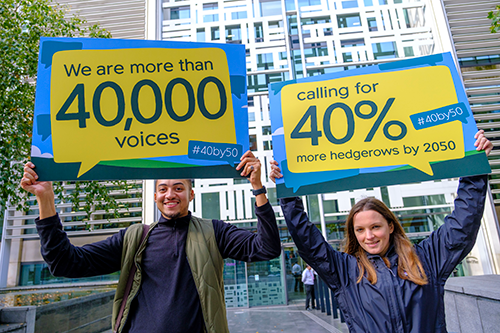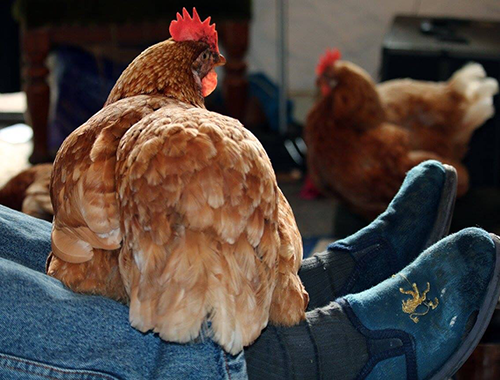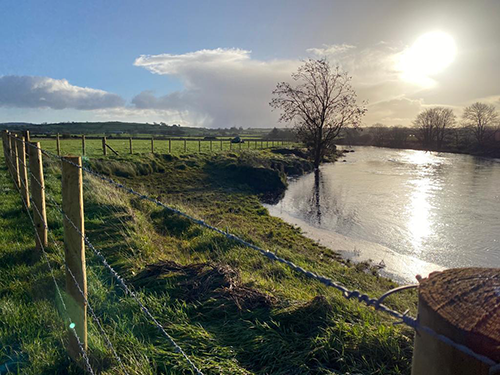Animals and the Environment 2023 winners: CPRE, the countryside charity
Why they won
- Outcomes: The campaign achieved its objective of securing a statutory target for hedgerow restoration
- Sustainability: If the hedgerow target is met, the hedges will continue to absorb carbon dioxide from the atmosphere for years to come
- Replicability: The “hero campaign” model which proved so successful can be used by the charity in future campaigns
CPRE, the countryside charity, has campaigned for hedgerow protection since the 1970s. The UK’s hedgerow network is its largest nature reserve, yet it has halved in size over the last eight decades because of changes in farming practices and development, among other things.
 After the Climate Change Committee recommended in its Net Zero report that the hedgerow network should be increased by 40% by 2050, CPRE launched its “40by50” campaign in July 2021 to encourage the government to adopt this target.
After the Climate Change Committee recommended in its Net Zero report that the hedgerow network should be increased by 40% by 2050, CPRE launched its “40by50” campaign in July 2021 to encourage the government to adopt this target.
The charity adopted 40by50 as its next “hero campaign”, meaning it would be prioritised across the entire organisation and should also feed into the charity’s wider corporate objectives.
The integrated campaign plan involved research reports, farmer surveys and engagement, media activity, petitions, site visits, parliamentary events, planting projects and more. The campaign focused on the positive benefits that greater hedgerow coverage would have on the environment, the rural economy, and local communities, with lobbying targeted at both Defra and the Treasury.
Simultaneously, each local CPRE was tasked with laying out what they could do to raise awareness of hedgerows and influence the government to agree to meet the target.
The campaign garnered support from the public and more than 80 cross-party politicians, with CPRE’s hedgerow petition attracting nearly 50,000 signatures.
Eighteen months later, the government announced the introduction of the first-ever hedgerow target in its Environmental Improvement Plan, to create or restore 30,000 miles of hedgerows by 2037 and 45,000 miles by 2050.
It also almost doubled the farm subsidy payment to incentivise farmers to engage in hedgerow restoration.
And it created a new post within the civil service dedicated specifically to hedgerows.
A few weeks before the announcement of the target, Trudy Harrison, minister for the natural environment, said: “Hedgerows are absolutely fantastic, as I saw for myself here in parliament at the hedgerow showcase of CPRE, the countryside charity. As we treble tree planting across this country, I will ensure that we do everything possible to put hedge planting and protection at the forefront of our priorities.”
Charity Awards judge Chris Sherwood said: “I liked not only the shift from protection to restoration of nature, but also the ask around farm subsidy payments – that was a really tangible win, because it is a key part of the farming system and it will incentivise behaviour.”
Judge Martin Edwards said: “In terms of what they set out to achieve, it was stunningly successful. And we should recognise how spectacularly difficult it is in the current climate of chronic government deficits to achieve a campaign that involves significant government investment over a long period of time.”
CC Reg no. 1089685
Highly Commended
British Hen Welfare Trust
Hens are not generally afforded the same healthcare as other pets. Often, owners are given poor veterinary support and told the only option is to have their pets put to sleep. The British Hen Welfare Trust (BHWT) launched the Improving Pet Hen Health initiative, enabling keepers to administer basic treatment at home and ensuring vets and vet nurses feel more confident when presented with a pet hen. As well as launching a free online learning course, BHWT relaunched its Hen Helpline in 2021, offering hen health support to all chicken keepers in the UK. Since January 2021, BHWT has received 2,916 calls from hen keepers. In a survey of 1,100 supporters, the service received an average score of 8.4 out of 10.
The Rivers Trust
The Rivers Trust Ltd partnered with Uisce Éireann, the Agri-Food and Biosciences Institute, East Border Region and Ulster University to develop a strategy to reduce pollution and improve water quality in the River Erne and River Derg catchment areas. In 2017, NI Water obtained a €4.9m grant from the EU and the UK to run a five-year project that aimed to empower communities, educate farmers on practical measures to make land management sustainable and protect water, and teach children the importance of the water journey. By 2022, on-farm water protection measures had been implemented on 118 farms in the River Derg catchment, which led to a 24% fall in herbicide concentration and a 40% reduction in total load.


